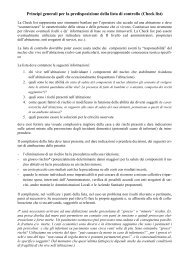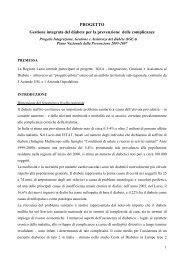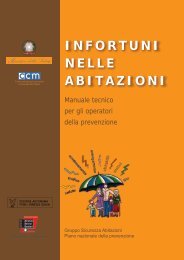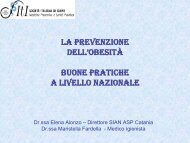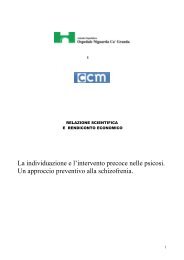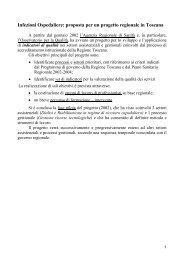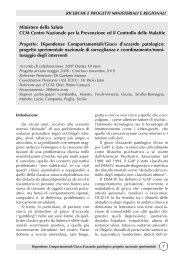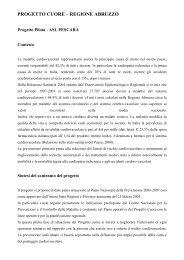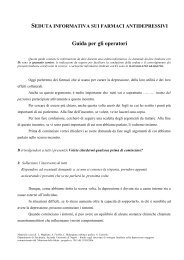Gaining health : analysis of policy development in European ...
Gaining health : analysis of policy development in European ...
Gaining health : analysis of policy development in European ...
Create successful ePaper yourself
Turn your PDF publications into a flip-book with our unique Google optimized e-Paper software.
Society <strong>of</strong> Nutrition and Foods, which brought together<br />
top academics with an <strong>in</strong>terest <strong>in</strong> the issue, there was little<br />
practical <strong>policy</strong> action. It is suggested (26) that this was<br />
partly because the lobby group did not have a clearly def<strong>in</strong>ed<br />
strategy and did not employ available epidemiological<br />
material to conv<strong>in</strong>ce <strong>policy</strong>-makers, but also that there was<br />
a dearth <strong>of</strong> people with tra<strong>in</strong><strong>in</strong>g <strong>in</strong> nutrition. In addition,<br />
mortality from nutrition-related causes was comparatively<br />
low at that time and Greeks were obviously still benefit<strong>in</strong>g<br />
from their Mediterranean diet. Greek experts were actively<br />
<strong>in</strong>volved <strong>in</strong> rais<strong>in</strong>g the issue <strong>of</strong> the Mediterranean diet <strong>in</strong><br />
<strong>in</strong>ternational research circles.<br />
Surveys carried out <strong>in</strong> the late 1990s <strong>in</strong>dicated that the<br />
pattern <strong>of</strong> nutrition <strong>in</strong> Greece was mov<strong>in</strong>g away somewhat<br />
from the traditional Mediterranean diet, although a very<br />
high <strong>in</strong>take <strong>of</strong> fruit and vegetables was still reported. Data<br />
on cause <strong>of</strong> death were also be<strong>in</strong>g improved <strong>in</strong> the sense<br />
that the categories “old age” and “unknown causes”, which<br />
had covered 20% <strong>of</strong> all deaths, were practically elim<strong>in</strong>ated<br />
(27). Gradually, a conv<strong>in</strong>c<strong>in</strong>g body <strong>of</strong> evidence was be<strong>in</strong>g<br />
collected <strong>in</strong>dicat<strong>in</strong>g that Greeks were <strong>in</strong>creas<strong>in</strong>gly burdened<br />
by nutrition-related diseases.<br />
In 1994, Greece jo<strong>in</strong>ed the jo<strong>in</strong>t WHO/EU study entitled<br />
<strong>European</strong> Prospective Investigation <strong>in</strong>to Cancer and Nutrition<br />
(EPIC), <strong>in</strong> which 22 research centres from 9 countries<br />
take part. In Greece, about 28 000 adult volunteers have<br />
been recruited, represent<strong>in</strong>g a broad range <strong>of</strong> socioeconomic<br />
groups. Apart from self-adm<strong>in</strong>istered questionnaires<br />
or telephone <strong>in</strong>terviews regard<strong>in</strong>g 24-hour dietary recall,<br />
this <strong>in</strong>cludes the use <strong>of</strong> blood samples and medical files <strong>in</strong> a<br />
longitud<strong>in</strong>al study.<br />
In 1999, a core group <strong>of</strong> nutrition experts moved from the<br />
School <strong>of</strong> Public Health to the new Public Health Nutrition<br />
and Nutritional Epidemiology Unit, created <strong>in</strong> the Department<br />
<strong>of</strong> Hygiene and Epidemiology <strong>of</strong> the University <strong>of</strong> Athens<br />
Medical School. This unit became a WHO collaborat<strong>in</strong>g<br />
centre for nutrition and, with the prestige <strong>of</strong> the university<br />
beh<strong>in</strong>d them, a small band <strong>of</strong> dedicated nutritionists under<br />
the leadership <strong>of</strong> Antonia Trichopoulou cont<strong>in</strong>ued to push<br />
for action to deal with the observed chang<strong>in</strong>g eat<strong>in</strong>g and<br />
morbidity patterns.<br />
In 1999, partly as a result <strong>of</strong> their pressure, the Hellenic<br />
Food Authority was established and became operational <strong>in</strong><br />
May 2001. This is a governmental organization, supervised<br />
by the M<strong>in</strong>istry <strong>of</strong> Development and based <strong>in</strong> Athens. A<br />
number <strong>of</strong> regional branches were foreseen but have not<br />
yet been developed. The pr<strong>in</strong>cipal aim <strong>of</strong> the Food Authority<br />
is to ensure that food produced, distributed and<br />
marketed <strong>in</strong> Greece meets high standards <strong>of</strong> food safety<br />
and hygiene and that the relevant legislation is enforced. It<br />
also has a division for nutrition <strong>policy</strong>, and is advised by a<br />
Committee for Nutrition Policy and other relevant experts.<br />
The fortuitous appo<strong>in</strong>tment <strong>of</strong> the Pr<strong>of</strong>essor <strong>of</strong> Epidemiology<br />
and Hygiene at Athens University as President <strong>of</strong> the<br />
Supreme Scientific Health Council meant that the University<br />
was asked to prepare food-based dietary guidel<strong>in</strong>es<br />
for adults <strong>in</strong> Greece. Through collaborative action by the<br />
M<strong>in</strong>istry <strong>of</strong> Health and Social Welfare, the M<strong>in</strong>istry <strong>of</strong> Agriculture,<br />
the M<strong>in</strong>istry <strong>of</strong> National Education and Religious<br />
Affairs and the M<strong>in</strong>istry <strong>of</strong> Development, with <strong>in</strong>put from<br />
a number <strong>of</strong> related NGOs, these guidel<strong>in</strong>es, based on the<br />
Mediterranean diet with its high use <strong>of</strong> olive oil, fruit and<br />
vegetables, were quickly developed and accepted by the<br />
Supreme Scientific Health Council (28).<br />
In 2003, the Committee for Nutrition Policy proposed<br />
a draft nutrition <strong>policy</strong> to the then M<strong>in</strong>ister for Health<br />
and Welfare. This was well-received by the M<strong>in</strong>ister, who<br />
def<strong>in</strong>ed the field <strong>of</strong> nutrition as be<strong>in</strong>g one <strong>of</strong> the significant<br />
factors that contribute not only to longer life expectancy<br />
but simultaneously to avoidance <strong>of</strong> illness and a better quality<br />
<strong>of</strong> life. However, before this could be f<strong>in</strong>alized, general<br />
elections brought <strong>in</strong> a new government. Accord<strong>in</strong>g to the<br />
Chapter 4<br />
113<br />
Case studies: <strong>policy</strong> <strong>development</strong> <strong>in</strong> countries for tackl<strong>in</strong>g noncommunicable diseases



